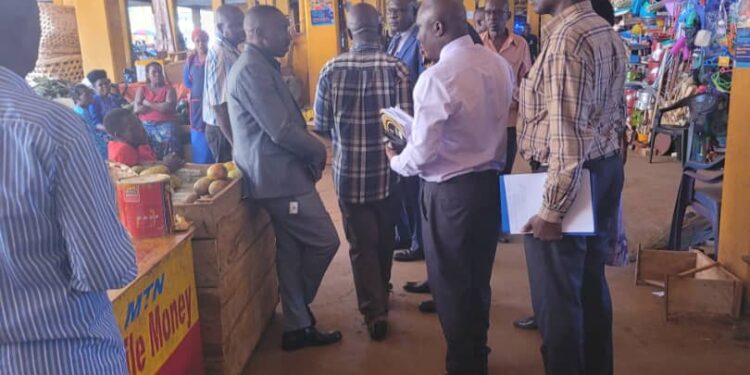In the bustling streets of Jinja City, two wholesalers, Nabongo Lobita and Namugandai Sarah, once struggled to attract customers to their wholesale shops situated along Alidina and Cutch roads respectively.
The entrances to their businesses were constantly blocked by hawkers selling the same items at lower rates, making it difficult for customers to access their shops.
Despite paying rent, VAT, and trading licenses, Nabongo and Namugandai’s businesses were struggling to stay afloat.
The hawkers, on the other hand, seemed to operate with impunity, leaving behind a trail of garbage and debris that made the area look unkempt.
Most of the hawkers had backing of some politicians and rogue civil servants.
The situation was further complicated by the lack of parking space, as hawkers occupied even the streets and walkways.
But with the introduction of a new trade order, the dynamics changed.
As Nabongo and Namugandai began to see growth in sales, they realized that tax compliance was not just a civic duty but a key to unlocking business growth and creating a fair and transparent business environment.
When Jinja City Council authorities embarked on an exercise dubbed ‘Trade Order’ to restore sanity in the way different people do business within the central Business District (CBD),nobody anticipated it would yield any positive results.
Sowali Omulyangere, a mid-age man who is the mastermind behind the trade order initiative, has been met with mixed reactions.
While some business owners like Nabongo Lobita and Namugandai Sarah welcome the efforts to restore order and fairness in the city’s central business district, others have expressed concerns about the impact on their livelihood
The trade order exercise aims to ensure compliance with tax laws and trading regulations, creating a level playing field for all businesses.
By clearing streets and walkways of hawkers and vendors, the initiative also seeks to improve the city’s aesthetics and enhance public safety.
As the exercise continues, Omulyangere’s team faces challenges from some hawkers and vendors who claim to have political backing.
However, the authorities that gave the mandate to the Sowali Omulyangere-led operations remain resolute in their determination to enforce the law and create a more organized and prosperous environment in Jinja City.
Anyone, whether a visitor or local would really want to see a well-organized city where one knows where to find particular items of interest, as opposed to searching aimlessly from one place to another.
The challenge of indiscipline among some hawkers and vendors coupled with the politicization of their demands can hinder efforts to create a well-organized and regulated business environment.
Some politicians are prioritizing short-term political gains over long-term benefits for the city, making it difficult to implement and enforce regulations.
These dynamics can lead to a situation where some individuals feel emboldened to disregard rules and regulations while others who comply may feel disadvantaged.
Finding a balance between supporting entrepreneurs and maintaining order in the city will be crucial for Jinja’s growth and development.
Some leaders are concerned that displacing hawkers and vendors who are often vulnerable women and youth could lead to unintended consequences such as increased crime and social insecurity.
They fear that without alternative livelihoods, these individuals might turn to activities like theft, pick pocketing, burglary, or prostitution which could further exacerbate social problems and health risks.
According to insiders at Jinja City Hall, the implementation of the trade order has led to a significant increase in revenue.
With businesses now more accessible to customers, owners are experiencing higher sales, enabling them to pay trading licenses and VAT returns more consistently.
This boost in revenue is positive outcome of the trade order initiative which a section of stakeholders wants to frustrate.
Sowali Mulyangere feels a sense ofulfilmentnt and gratitude for being able to serve his community in a challenging area bringing order and structure to the city.
He sees it as a privilege and a blessing from God to make a positive impact on the lives of residents despite potential resistance.
Sowali is concerned that the progress made with the trade order initiative might be disrupted by politicians as the 2026 general elections approach.
He anticipates that some leaders may prioritize populist measures to gain votes, thus potentially undermining the efforts to maintain order and structure in the city.
As Jinja City continues to navigate the complexities of implementing the trade order initiative, it is crucial for all stakeholders to recognize that a more organized, clean, and beautiful city is a collective victory.
The benefits of a well-planned business environment extend beyond civil servants and politicians to every hawker, vendor, and customer.
By working together to strike a balance between entrepreneurship and regulation, pundits say Jinja City can unlock its full potential, fostering economic growth, social stability, and a better quality of life for all its residents.
The question is, will stakeholders seize this opportunity to build a brighter future for Jinja City, or will short-term interests ahead of the much-anticipated 2026 general polls prevail.
Do you have a story in your community or an opinion to share with us: Email us at editorial@watchdoguganda.com













